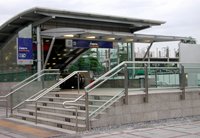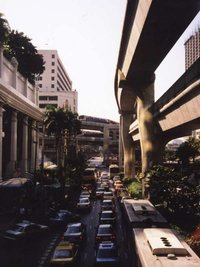Bangkok
|
|
Ac.bangkok3.jpg
Bangkok, (in Thai กรุงเทพฯ, กรุงเทพมหานคร, or Krung Thep, Krung Thep Mahanakhon), population 8,538,610 (1990), is the capital and largest city of Thailand. The city is located on the east bank of the Chao Phraya River, near the Gulf of Thailand. Bangkok is located at Template:Coor dm. [1] (http://earth-info.nga.mil/gns/html/cntry_files.html)
Bangkok is one of the fastest-growing, most economically dynamic and socially progressive cities in Southeast Asia. Local people like to think that it is emerging as a regional centre to rival Singapore and Hong Kong, but it suffers from major infrastructure and social problems as a result of its rapid growth. It is also one of the world's most popular tourist destinations.
| Contents |
History
Bangkok4.jpg
Wat_Phra_Kaew_outside_view.jpg
Bangkok began as a small trading center and port community, called Bang Makok ("place of olive plums"), serving Ayutthaya, which was the capital of Siam until it fell to Burma in 1767. A capital was established at Thonburi (now part of Bangkok) on the west side of the river, before in 1782 King Rama I built a palace on the east bank and made Bangkok his capital, renaming it Krung Thep, meaning "City of Angels". The village of Bangkok ceased to exist, but its name continues to be used by foreigners.
The full ceremonial name of Krung Thep is
- กรุงเทพมหานคร อมรรัตนโกสินทร์ มหินทรายุธยามหาดิลก ภพนพรัตน์ ราชธานีบุรีรมย์ อุดมราชนิเวศน์ มหาสถาน อมรพิมาน อวตารสถิต สักกะทัตติยะ วิษณุกรรมประสิทธิ์ or Krung Thep Mahanakhon Amon Rattanakosin Mahinthara Ayuthaya Mahadilok Phop Noppharat Ratchathani Burirom Udomratchaniwet Mahasathan Amon Piman Awatan Sathit Sakkathattiya Witsanukam Prasit, which means The city of angels, the great city, the eternal jewel city, the impregnable city of God Indra, the grand capital of the world endowed with nine precious gems, the happy city, abounding in an enormous Royal Palace that resembles the heavenly abode where reigns the reincarnated god, a city given by Indra and built by Vishnukarn.
Local schoolchildren are taught the full name, although few can explain its meaning because many of the words are archaic. Most Thais who do recall the full name do so as it was used in a popular song (กรุงเทพมหานคร/Krung Thep Mahanakhon by อัสนี-วสันต์ โชติกุล/Asanee-Wasan Chotikul 1989) and will often recount it by recalling the song at the same time, much in the same way that English speakers sing the alphabet song while reciting the English alphabet.
Administration
| Statistics | |
|---|---|
| Capital: | n/a |
| Area: | 1,568.7 km² Ranked 68th |
| Inhabitants: | 6,355,144 (2000) Ranked 1st |
| Pop. density: | 4,051 inh./km² Ranked 1st |
| ISO 3166-2: | TH-10 |
| Map | |

| |
Administratively, Bangkok is one of two special administration areas in Thailand, (the other being Pattaya), in which citizens vote to choose their Governor, unlike in Thailand's 75 other provinces (changwat). In the last gubernatorial election in 2004 Apirak Kosayothin was elected Governor.
The urban sprawl of Greater Metropolitan Bangkok extends beyond the borders of Bangkok province, spilling into the neighbouring provinces of Nonthaburi, Samut Prakan and Pathum Thani. The province as it is today was created in 1972 when the previous Bangkok province - changwat Phra Nakhon - merged with Thonburi province.
The seal of the city shows the god Indra riding in the clouds on Erawan, a mythological elephant-shaped creature (sometimes portrayed with three heads). In his hand Indra holds a lightning bolt, which is his weapon to drive away drought. The seal is based upon a painting done by Prince Naris. The tree symbol of Bangkok is Ficus benjamina.
Bangkok is subdivided into 50 districts (khet, also sometimes called amphoe as in the other provinces), which are further subdivided into 154 kwaeng (แขวง, equivalent to tambon in other provinces).
Economy
Bangkok is the economic center of Thailand. The Chao Phraya River allows Bangkok to function as a port. The Stock Exchange of Thailand is located in Bangkok. Tourism is a major source of revenue. The city contains many Buddhist temples (known in Thai as Wats), among the best known being Wat Pho and Wat Arun. Khaosan Road, near the Grand Palace complex, is a popular destination for young backpackers. Bangkok's educational and cultural facilities include several universities, a fine arts academy, a national theater and a national museum.
Processed food, timber, and textiles are leading exports. Industrial plants include rice mills, cement factories, sawmills, oil refineries, and shipyards. The city is a famous jewelry center, buying and selling silver and bronzeware. Although technically illegal, prostitution is a major activity in Bangkok, making the city a popular destination for sex tourism.
Transportation
Bangkokcanal2.JPG
An elaborate network of canals (khlong) gave the city the nickname "Venice of the East", at a time when all transportation was done by boat. Today almost all are filled in and converted into traffic-filled streets. However, many do still exist, with people living along them, and markets being conducted there as well.
Several elevated highways, and a partially-finished ring road around Greater Bangkok, have been built to overcome the jams.
In 1999 an elevated two-line 'Skytrain' (officially called BTS) metro system was opened. The first line of the underground Bangkok Metro opened to the public in July 2004. The remains of a failed elevated railroad project (the Hopewell project) can still be seen all the way from the main railroad station out towards the Don Muang airport - due to the Asian financial crisis the construction was halted and the concrete pillars were left unused. Locals call them Stonehenge.
In July 2004, a new MRT subway system was launched connecting the northern train station of Bang Sue to the Hua Lamphong railway station near the city center, while going through the eastern part of the city. It connects to the BTS system at BTS Stations Mo Chit, Asok, and Sala Daeng.
For travel by train, most passengers begin their trips at Hua Lamphong, at the southern end of the Metro. Here, trains connect Bangkok to Malaysia to the south, Chiang Mai and beyond to the north, and Khon Kaen and beyond to the northeast.
Virtually all cities and provinces are easily reachable by bus from Bangkok. For destinations in the southwest and the west, buses leave from the Southern Bus Terminal, west of the city. For destinations in the southeast, such as Pattaya and Ko Samet, buses leave from the Eastern Bus Terminal, at Ekkamai, the third-eastern-most stop on the Skytrain. And for all destinations north and northeast, the Northern Bus Terminal at Mo Chit, which is reachable by both Skytrain and Metro, is the place to start.
Bangkok International Airport, commonly called "Don Muang", the busiest in South-East Asia, is located north of the city, now already enclosed by urban areas. Construction for the new Suvarnabhumi Airport (pronounce Suwannaphum), in the Bang Phli district of Samut Prakan Province to the south-east of the city started in 2002, it is scheduled to be opened in early 2006. Once the new airport is completed, all international traffic is expected to go there and Don Muang will become domestic only. There is also a train station at Don Muang for destinations to the north and northeast.
Current issues
Air pollution is a major problem in Bangkok, blamed on the city's massive traffic jams. The recent construction of elevated second-level expressways has eased the problem a little.
The sale of illegally copied copyright material (mostly software and DVD movies) is widespread in Bangkok. One of the most popular locations in Bangkok for purchasing pirated software is Pantip Plaza. Although many attempts have been made at cracking down on illegal copying by raiding Pantip and other venues over the years, these have been ineffective and illegal copying of copyrighted material is still a booming business. The BSA, an American software copying prevention group believes that it could extract 80 million USD from Thailand if all of illegally copied software there was stopped [2] (http://www.bbcworld.com/content/clickonline_archive_46_2003.asp?pageid=666&co_pageid=2). Due to heavy, long term pressure[3] (http://www.ustr.gov/html/1995_thailand.html) from groups such as the BSA and the Recording Industry Association of America, which threatened difficulties for trade agreements for Thailand [4] (http://www.riaa.com/news/newsletter/033004_2.asp), the Thai government has now started to crack down heavily on the unauthorised copying by its citizens including the introduction of "one of the most aggressive legislative schemes for the protection of intellectual property rights in any developing nation"[5] (http://members.tripod.com/asialaw/articles/takingcopyright.html). However, these measures have not yet halted the appetite of Thai citizens for unauthorised copies, the sale of unauthorised discs continues and the raids have been called "half hearted". The BSA states, however, that reduction of illegal copying is a long term goal [6] (http://news.bbc.co.uk/1/hi/technology/3227622.stm) and that the aim now is more to re-educate the Thais towards the BSA's own views.
External links
- Bangkok Metropolitan Administration (http://www.bma.go.th/)
- Tourist Authority of Thailand - Bangkok Information (http://www.tourismthailand.org/province/province.php?id=56)
- Bangkok Travel Guide at Wikitravel (http://www.wikitravel.org/article/Bangkok)
- Bangkok has the world's longest place name (http://www.thailandlife.com/ericshackle/placename.html)
- Bangkok Skytrain and MRTA Map and Info (http://www.urbanrail.net/as/bang/bangkok.htm)
- Map of Bangkok (http://www.hot-maps.de/asia/thailand/bangkok/homeen.html)
- Pictures of various places in Bangkok (http://www.bangkokpicture.com/)af:Bangkok
cs:Bangkok da:Bangkok de:Bangkok es:Bangkok eo:Bangkok et:Bangkok fr:Bangkok hi:बैंकॉक id:Bangkok he:בנגקוק lt:Bankokas ms:Bangkok nl:Bangkok ja:バンコク no:Bangkok pl:Bangkok pt:Banguecoque ro:Bangkok simple:Bangkok sk:Bangkok sl:Bangkok fi:Bangkok sv:Bangkok th:กรุงเทพมหานคร zh:曼谷



